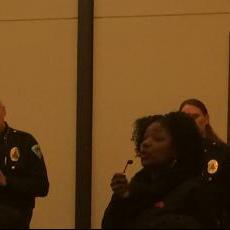






 Young, Gifted and Black Coalition's Brandi Grayson, right, speaks about policing on South Madison at a forum with Madison Police Chief Mike Koval, left (Franco Latona/Madison Commons).
Young, Gifted and Black Coalition's Brandi Grayson, right, speaks about policing on South Madison at a forum with Madison Police Chief Mike Koval, left (Franco Latona/Madison Commons).
UPDATE: The Young, Gifted and Black Coalition has organized several events in response to the shooting death of Tony Robinson, including community meetings and protests.
Madison Police Chief Mike Koval and members of the Young, Gifted and Black Coalition, which seeks to call attention to what they say are racial disparities in policing, debated at a public forum held Thursday at the Catholic Multicultural Center on Madison's south side.
The forum was the last in a series of community meetings held by Koval throughout the city.
In a crowded room, members of the YGB repeatedly accused Madison Police of racial profiling.
“Most white people and most people that work in the system are conditioned to think less of us, and assume that we're inferior, which leads to an arrest ratio of 8-1,” said Brandi Grayson of YGB during the forum.
Eric Upchurch, also with YGB, said “your parents and your parents' parents had the belief that we were undeserving people, and innately they passed that down to you.”
Koval disputed the 8-1 arrest ratio in Madison between African American and white adult men, which was part of the Race to Equity report that described racial disparities throughout Madison. Koval called that report a “terrible statistical compilation,” and said that race does not influence the likelihood of arrest.
“We have to find if there is an articulable basis, based on legal facts, that reach a legal threshold of probable cause—and we're talking about criminal arrests—and if in fact that's unsupported by those facts, then we can't make the arrest.”
YGB members pressed Koval about over-patrolling areas on the south side with higher minority populations. Last month, YGB members wrote a letter to Koval demanding that police stay out of their neighborhoods.
"The relationship that we desire to have with the police is simple: no interaction,” read one line in the letter.
But during the forum Koval said that sentiment is in conflict with what he is hearing from most people around the city, including the south side.
“I have a lot of people that say, 'we like seeing the police, it gives us a sense of wellbeing, we like the fact that you're there and you're visible,'” Koval said.
Still, Grayson was not convinced.
“I live on the south side. I work on the south side, I go to school over here, everything is over here for me,” she said after the forum. “So I see about three or four different cops in a couple hours. One sits across the street from the liquor store, one sits over by Penn Park; one sits by the transfer point. So if you have this twenty-mile radius (the approximate distance of Madison's south side jurisdiction), but you're only patrolling two blocks with three police officers, what does that say to the neighborhood and the people in it?”
Despite her frustration, Grayson said YGB members got their points across.
“I think he's heard us loud and clear and that's why he's pissed off,” she said after the forum.
Koval never raised his voice during the forum, but at times he appeared irritated by the criticism directed towards himself and his staff.
Looking directly at Church following his comments, Koval said, “while I have nothing but respect for your opinion, I do think you're disrespecting 455 people (the number of police on Madison's force) with these grandiose, over-the-top statements, which predicate that all of us are cut from the same cloth, and are unfeeling, and uncaring, and not invested in our neighborhoods.”
But while Koval and YGB members — many of whom left after they finished speaking — disagreed on a number of issues, towards the end of the forum Koval announced that Madison's south side jurisdiction will implement a restorative justice court this spring, a statement that brought applause from almost everyone in the room.
Koval said that first time criminal offenders will undergo an assessment by members of the community, “not police officers,” as to the causes of why a crime was committed. Once causes have been identified, say, a person stole food because he was jobless and hungry, Koval said the offender will be eligible by his own consent to participate in corrective action initiatives. In said case it would be something like assistance in landing steady employment. Koval said that if the participant completes the program successfully, his offense will be expunged from his record.
“It will not be recorded that you've ever been arrested,” Koval said.
Koval said the restorative justice court will be implemented this April.
|
|
|
Welcome to the Madison Commons, a website designed to provide news and information about all of Madison's neighborhoods and a crossroads for the discussion of community issues. The name comes from the idea of a village commons, a place for news, talk, debate, and some entertainment, too, that's open to everyone.
All rights reserved. Read more about the Madison Commons and its partners.

